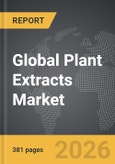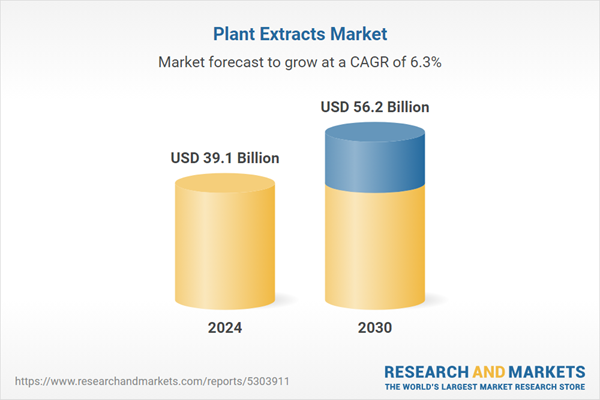Global Plant Extracts Market - Key Trends & Drivers Summarized
What Are Plant Extracts and Why Are They Important Across Industries?
Plant extracts refer to substances obtained by extracting bioactive compounds from different parts of plants, such as leaves, roots, seeds, flowers, or bark, using solvents or other extraction techniques. These extracts contain a wide array of beneficial compounds, including alkaloids, flavonoids, essential oils, tannins, and polyphenols, making them valuable for various applications in industries such as pharmaceuticals, food and beverages, cosmetics, and nutraceuticals. Over the years, plant extracts have gained significant importance due to their natural origins and therapeutic properties. In the pharmaceutical sector, they are used to develop medications for treating ailments such as inflammation, infections, and chronic diseases. The food and beverage industry uses plant extracts for flavoring, coloring, and preservation, while in cosmetics, they are prized for their antioxidant, anti-aging, and moisturizing properties. The growing consumer preference for natural and plant-based ingredients over synthetic chemicals has also fueled the demand for plant extracts. As global concerns about health, sustainability, and environmental impact continue to rise, plant extracts offer a compelling solution due to their ability to provide natural, eco-friendly, and health-promoting ingredients for a wide range of products.How Are Technological Advancements Driving the Plant Extracts Industry?
Technological innovations have revolutionized the plant extracts industry, enabling more efficient, precise, and sustainable extraction methods. One of the key developments is the advancement in extraction techniques, such as supercritical CO2 extraction, which allows for the precise separation of plant compounds without the use of harmful solvents. This method is particularly important for industries like pharmaceuticals and nutraceuticals, where the purity and safety of extracts are paramount. Similarly, cold pressing and ultrasound-assisted extraction techniques have improved the efficiency of obtaining high-quality extracts while preserving the bioactive compounds that are often sensitive to heat or harsh chemicals. The rise of green chemistry has also led to the development of more environmentally friendly extraction processes, reducing the carbon footprint and waste associated with traditional extraction methods.Additionally, encapsulation technologies are enhancing the stability and bioavailability of plant extracts, especially for use in food supplements and pharmaceuticals. Nanotechnology is being applied to encapsulate plant extracts, allowing for better control over the release of active compounds in the body, which increases their efficacy. In the cosmetics industry, technological advancements have enabled the extraction of plant stem cells, which are rich in growth factors and antioxidants, providing anti-aging and regenerative benefits in skincare products. The increasing use of artificial intelligence (AI) and machine learning in extraction process optimization is also helping companies reduce costs, improve yield, and maintain consistency in the quality of plant extracts. These innovations are driving growth in the plant extracts industry by making the extraction process more sustainable, efficient, and tailored to meet the specific needs of various industries.
What Challenges Are Fueling the Demand for Plant Extracts?
Several global challenges are propelling the demand for plant extracts, particularly in sectors focused on health, wellness, and sustainability. One of the foremost challenges is the growing consumer demand for natural, clean-label products. As consumers become more conscious of the ingredients in their food, supplements, and personal care products, they are increasingly opting for natural alternatives to synthetic chemicals. This trend is especially strong in the food and beverage industry, where plant extracts are used as natural flavorings, colorants, and preservatives to meet the demand for healthier and more sustainable products. Another significant challenge is the increasing prevalence of lifestyle-related health issues such as obesity, diabetes, and cardiovascular diseases. In response, the nutraceutical industry is turning to plant extracts for their potential health benefits, as many extracts possess antioxidant, anti-inflammatory, and metabolic-boosting properties that can aid in disease prevention and management.Environmental sustainability is also a driving factor in the demand for plant extracts, particularly in industries like cosmetics and agriculture. As awareness of the environmental impact of synthetic chemicals grows, plant extracts offer a natural alternative that aligns with the shift toward eco-friendly and sustainable production practices. For example, in agriculture, plant extracts are being used as natural pesticides and growth enhancers, reducing the reliance on chemical fertilizers and pesticides. Additionally, the increasing regulatory scrutiny around the use of synthetic additives and preservatives in food and personal care products is pushing companies to replace these ingredients with plant-based extracts that meet regulatory standards for safety and natural origin. These challenges underscore the rising importance of plant extracts as companies across various sectors seek to address consumer demands for health, wellness, and environmental responsibility.
What Factors Are Driving the Growth in the Plant Extracts Market?
The growth in the plant extracts market is driven by several key factors that reflect shifting consumer preferences, industry innovations, and regulatory landscapes. One of the most significant drivers is the increasing consumer demand for natural and plant-based products, particularly in the food and beverage, personal care, and pharmaceutical industries. As consumers become more health-conscious and aware of the potential side effects of synthetic ingredients, they are gravitating toward products formulated with plant extracts that offer natural therapeutic benefits. This trend is particularly strong in the food and nutraceutical sectors, where plant-based ingredients are sought after for their health-promoting properties, such as antioxidants, vitamins, and anti-inflammatory compounds.Additionally, the expansion of the global wellness and nutraceutical markets is fueling demand for plant extracts used in dietary supplements, herbal medicines, and functional foods. Consumers seeking preventive health solutions are turning to plant extracts like ginseng, turmeric, and green tea for their scientifically backed health benefits. The rise of veganism and plant-based diets is also contributing to the growth of plant extracts in the food industry, where natural extracts are being used to create plant-based alternatives to traditional animal-derived products.
Technological advancements in extraction processes are further driving market growth by improving the quality, efficiency, and sustainability of plant extracts. Innovations in green extraction technologies and the use of AI for optimizing extraction methods are making it easier for companies to produce high-purity extracts with minimal environmental impact. Regulatory support for the use of plant extracts in various industries is also a key growth factor. In the cosmetics industry, for example, plant-based ingredients are increasingly favored as consumers seek clean beauty products free from harmful chemicals. Furthermore, the growing research into the medicinal and therapeutic properties of plant extracts is expanding their application in pharmaceuticals and healthcare, driving the market forward. These factors collectively contribute to the robust growth of the plant extracts market, which continues to evolve in response to changing consumer preferences and technological innovations.
Report Scope
The report analyzes the Plant Extracts market, presented in terms of market value (US$ Thousand). The analysis covers the key segments and geographic regions outlined below.- Segments: Type (Phytomedicines & Herbal Extracts, Spices, Essential Oils, Flavors & Fragrances); Source (Fruits, Flowers & Bulbs, Leaves, Rhizomes & Roots, Barks & Stems, Other Sources); Application (Pharma & Dietary Supplements, Food & Beverage, Cosmetics, Other Applications).
- Geographic Regions/Countries:World; United States; Canada; Japan; China; Europe (France; Germany; Italy; United Kingdom; Spain; Russia; and Rest of Europe); Asia-Pacific (Australia; India; South Korea; and Rest of Asia-Pacific); Latin America (Argentina; Brazil; Mexico; and Rest of Latin America); Middle East (Iran; Israel; Saudi Arabia; United Arab Emirates; and Rest of Middle East); and Africa.
Key Insights:
- Market Growth: Understand the significant growth trajectory of the Phytomedicines & Herbal Extracts segment, which is expected to reach US$27.7 Billion by 2030 with a CAGR of a 7.3%. The Spices segment is also set to grow at 6.2% CAGR over the analysis period.
Why You Should Buy This Report:
- Detailed Market Analysis: Access a thorough analysis of the Global Plant Extracts Market, covering all major geographic regions and market segments.
- Competitive Insights: Get an overview of the competitive landscape, including the market presence of major players across different geographies.
- Future Trends and Drivers: Understand the key trends and drivers shaping the future of the Global Plant Extracts Market.
- Actionable Insights: Benefit from actionable insights that can help you identify new revenue opportunities and make strategic business decisions.
Key Questions Answered:
- How is the Global Plant Extracts Market expected to evolve by 2030?
- What are the main drivers and restraints affecting the market?
- Which market segments will grow the most over the forecast period?
- How will market shares for different regions and segments change by 2030?
- Who are the leading players in the market, and what are their prospects?
Report Features:
- Comprehensive Market Data: Independent analysis of annual sales and market forecasts in US$ Million from 2024 to 2030.
- In-Depth Regional Analysis: Detailed insights into key markets, including the U.S., China, Japan, Canada, Europe, Asia-Pacific, Latin America, Middle East, and Africa.
- Company Profiles: Coverage of players such as Arjuna Natural Extracts Ltd., Döhler, Givaudan, International Flavors & Fragrances, Inc., Kangcare Bioindustry Co., Ltd. and more.
- Complimentary Updates: Receive free report updates for one year to keep you informed of the latest market developments.
Some of the 36 companies featured in this Plant Extracts market report include:
- Arjuna Natural Extracts Ltd.
- Döhler
- Givaudan
- International Flavors & Fragrances, Inc.
- Kangcare Bioindustry Co., Ltd.
- Martin Bauer GmbH & Co. KG
- Native Extracts Pty. Ltd.
- PT. Haldin Pacific Semesta
- PT. Indesso Aroma
- Sensient Technologies
- Shaanxi Jiahe Phytochem Co., Ltd.
- Symrise AG
- Synthite Industries Private Ltd.
- Tokiwa Phytochemical Co. Ltd.
- Vidya Herbs Private Limited
This edition integrates the latest global trade and economic shifts into comprehensive market analysis. Key updates include:
- Tariff and Trade Impact: Insights into global tariff negotiations across 180+ countries, with analysis of supply chain turbulence, sourcing disruptions, and geographic realignment. Special focus on 2025 as a pivotal year for trade tensions, including updated perspectives on the Trump-era tariffs.
- Adjusted Forecasts and Analytics: Revised global and regional market forecasts through 2030, incorporating tariff effects, economic uncertainty, and structural changes in globalization. Includes historical analysis from 2015 to 2023.
- Strategic Market Dynamics: Evaluation of revised market prospects, regional outlooks, and key economic indicators such as population and urbanization trends.
- Innovation & Technology Trends: Latest developments in product and process innovation, emerging technologies, and key industry drivers shaping the competitive landscape.
- Competitive Intelligence: Updated global market share estimates for 2025, competitive positioning of major players (Strong/Active/Niche/Trivial), and refined focus on leading global brands and core players.
- Expert Insight & Commentary: Strategic analysis from economists, trade experts, and domain specialists to contextualize market shifts and identify emerging opportunities.
Table of Contents
Companies Mentioned (Partial List)
A selection of companies mentioned in this report includes, but is not limited to:
- Arjuna Natural Extracts Ltd.
- Döhler
- Givaudan
- International Flavors & Fragrances, Inc.
- Kangcare Bioindustry Co., Ltd.
- Martin Bauer GmbH & Co. KG
- Native Extracts Pty. Ltd.
- PT. Haldin Pacific Semesta
- PT. Indesso Aroma
- Sensient Technologies
- Shaanxi Jiahe Phytochem Co., Ltd.
- Symrise AG
- Synthite Industries Private Ltd.
- Tokiwa Phytochemical Co. Ltd.
- Vidya Herbs Private Limited
Table Information
| Report Attribute | Details |
|---|---|
| No. of Pages | 381 |
| Published | February 2026 |
| Forecast Period | 2024 - 2030 |
| Estimated Market Value ( USD | $ 39.1 Billion |
| Forecasted Market Value ( USD | $ 56.2 Billion |
| Compound Annual Growth Rate | 6.3% |
| Regions Covered | Global |









